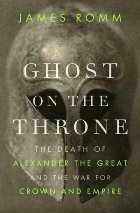 By James Romm, Knopf, 342 pages
By James Romm, Knopf, 342 pages
In his book, Ghost on the Throne, author James Romm transports the reader back to the years of 323-317 BCE, a turbulent seven-year period following the unexpected death of one of the greatest military commanders in history: Alexander the Great.
According to legend, Alexander left the succession of his empire “to the strongest”, ensuring that Alexander’s military commanders, or “bodyguards”, would use their individual power and influences to lay claim to both the empire and to the crown — two very separate entities. Control of the military guaranteed one the power, if only temporarily, of the empire. But it was the connection to the royal family through marriage that validated one’s claim to the royal crown through divine providence.
An intriguing part of Romm’s narrative revolves around the power one held if in possession of Alexander’s newly mummified corpse—the ghost. Simply put, possession of the body, entombed in a gold sarcophagus, translated to the personal blessing of Alexander himself, and therefore legitimized the claimant’s assertion to rule the empire.
Ghost on the Throne provides thought-provoking insight into the machinations of the various claimants to a post-Alexander empire. Presenting his research in a chronological format, Romm successfully tells the story of heroes and villains, victims and victors—and women—strong females who play an instrumental role in the future of the empire.
Reviewed by Cheri Woods-Edwin
